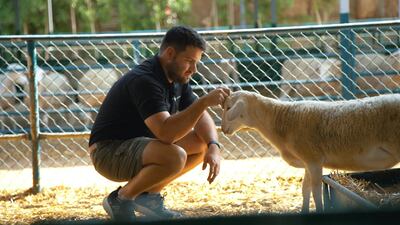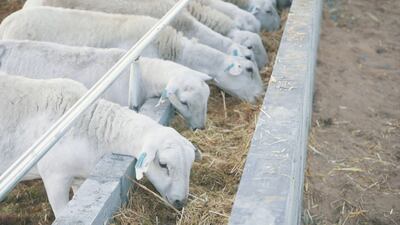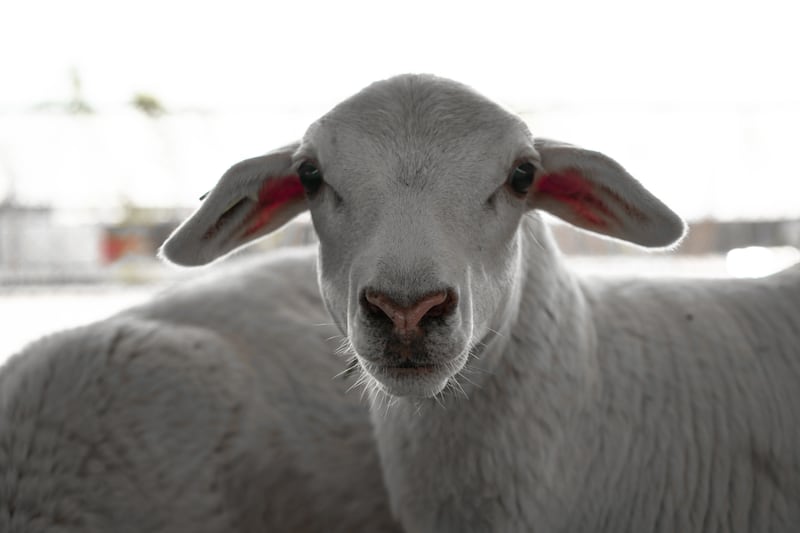Science-led farming, being used to breed sheep that are suited to the warmer Gulf environment, promises to transform livestock rearing and improve animal welfare by reducing the need for live imports.
Farmers breeding grass-fed Australian White sheep in the UAE use marginal gains — the theory that small yet significant improvements that can lead to big results — in how they are reared to maximise high-quality lamb.
Due to its early success, Verticroft Holdings is moving its operations from Dubai to a huge farm in Abu Dhabi with the capacity to rear 7,000 sheep sustainably.
Flock data is scrutinised to monitor healthy growth, with the sheep capable of withstanding the desert heat inside sheds with space and shading.
When ewes become pregnant, they are transferred to a cooled barn during summer to offer the best chance of a healthy birth.
“As cattle is expensive and camel is already well established, we saw a gap in the market for lamb and goat rearing on a commercial scale,” said Amine Ben, chief operating officer at Verticroft Holdings in Dubai.
“From Australia, around $3 billion of fresh and frozen meat is imported annually to the region, and about 10 million live animals, and we know over the next five to 10 years there will be a reduction in exports from some countries to this region.
“We have seen the pressures increase, so there will be a gap in this market for live animal requirements.”
In 2021, an agricultural development plan was established by Abu Dhabi Agriculture and Food Safety Authority to increase the efficiency of sustainable farming.
It aims to increase productivity and economic return from farming, while adapting to climate change and reducing greenhouse gas emissions.

Since first flying in on a Singapore Airlines plane in 2020, the Verticroft flock of fast-growing Australian White sheep has swelled in numbers to more than 1,500.
While the expensive process limits customers to high-end hotels and restaurants, costs are expected to fall as the farm's innovative techniques become more common.
Pregnancy scans are carried out regularly, with flock data stored in the cloud to maintain accurate health records. In addition, hydroponic farming supplies the flock with barley to supplement feed.
“Technology is a big part of managing reproductive ratios,” said Mr Ben. “We have data on intramuscular fat, cholesterol and beneficial fats of our animals.
“The sheep has been designed through cross-breeding to have these characteristics.
“This breed is designed to operate in extreme heat and cold. It will grow or shed its hair accordingly.
“They are adaptable and have been reared in Western Australia where it gets as hot as the UAE.
“If an animal is pregnant we put them in a cooled greenhouse that allows us to lamb in the summer.
“It gives us better fertility rates and productivity.”
Sheep imports under pressure
According to the open data platform Trend Economy, the region imports some of the largest numbers of sheep in the world.
In 2021, the largest sheep importer was Saudi Arabia with 29 per cent of world imports ($494 million), followed by Oman, with 16.3 per cent ($278 million), Jordan at 12 per cent ($203 million) and Qatar with 6.93 per cent ($117 million) of all global sheep imports.
Typically, 60,000 live sheep at a time are crammed on to livestock ships that leave Western Australia to supply Gulf markets.

The journey can take up to three weeks, and although transporting animals during summer is now banned, the voyage remains arduous.
In 2017, about 2,400 sheep died on board a livestock ship from Fremantle to the Middle East, the majority from heat stress.
Australia is one of the largest exporters of sheep, but its government is currently looking at phasing out live exports due to welfare concerns, which is likely to place added pressure on regional livestock markets.
Although a timetable for phasing out live sheep exports by sea has not yet been clarified, it is under consultation and expected to happen this year.
“When you import animals on livestock vessels, the quality being exported is not high; they are usually the overstock that cannot be sold locally,” said Mr Ben.
“We want to show this can be done and introduce this breed to the wider region to show what is possible and establish new pillars for sheep farming operations.”







